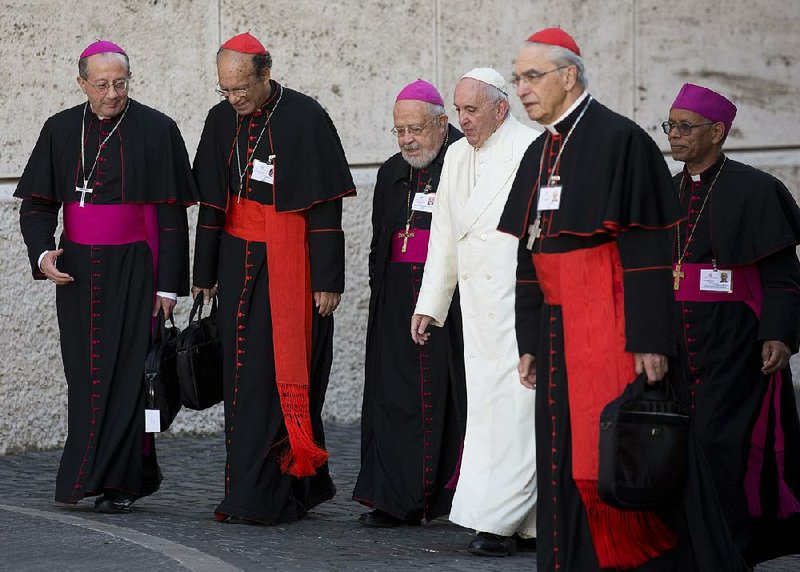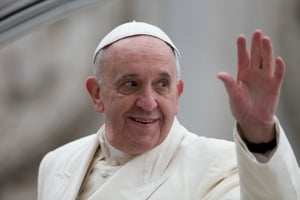VATICAN CITY -- Catholic bishops called Saturday for a more welcoming church for cohabiting couples, gays and Catholics who have divorced and civilly remarried, endorsing Pope Francis' call for a more merciful and less judgmental church.
Bishops from around the world adopted a final document at the end of a divisive, three-week synod on providing better pastoral care for Catholic families. It emphasizes the role of discernment and individual conscience in dealing with difficult family situations.
Conservatives had resisted offering any wiggle room in determining, for example, whether civilly remarried Catholics can receive Communion because church teaching forbids it. While the document doesn't chart any specific path to receiving the sacraments as originally sought by the liberal bishops, the document opens the door to case-by-case exceptions to church teaching by citing the role of discernment and conscience.
The three paragraphs dealing with the issue barely reached the two-thirds majority needed to pass, but conservatives couldn't muster enough votes to shoot them down. That will give Francis the maneuvering he needs if he wants to push the issue further in a future document of his own.
In a final speech to the synod, Francis criticized those who hold up church doctrine above all else and use it to cast judgment on others who don't measure up.
Francis told the synod it had "laid bare the closed hearts which frequently hide even behind the church's teachings and good intentions, in order to sit in the chair of Moses and judge, sometimes with superiority and superficiality, difficult cases and wounded families."
"The synod experience also made us better realize that the true defenders of doctrine are not those who uphold its letter, but its spirit; not ideas but people; not formulas but the free availability of God's love and forgiveness," he said.
The document is the culmination of a two-year process initiated by Francis to put in practice his call for a church that is more a "field hospital for wounded souls" than an exclusive club for the perfect.
The bishops took his direction, finding "positive elements" in couples who live together even though they are not married. Rather than condemning these couples for living in sin, the document says pastors should look at their commitment constructively and encourage them to transform their union in a sacramental marriage.
On gays, the synod document repeats church teaching that gays should be respected and loved and, in a novelty, says families with gay members require particular pastoral care. It strongly rejects gay marriage, but omits references to church teaching that homosexual acts are "intrinsically disordered."
Only the 275 synod "fathers" were allowed to vote -- none of the handful of women invited to participate -- even though one of the "fathers" with voting rights wasn't a priest, much less a bishop.
Brother Herve Janson of the Little Brothers of Jesus told reporters he considered turning down the invitation to participate, given that his status in the church is the same as a sister who heads a religious order of nuns.
"I was very upset, because while before the distinction [between voting and nonvoting members] was between the clergy and laity, now it has become between man and woman," he said.
It wasn't clear whether Francis intended to raise the issue of broader participation in the synod by letting Janson vote, or if his role was a one-time anomaly.
Earlier this year, Francis made a new law making it easier for divorced couples to obtain an annulment, which is a church declaration that their marriage was invalid. That was aimed at answering a complaint by generations of Catholics who have been denied the sacraments because they divorced and remarried outside the church without an annulment.
The synod was about far more than just contentious issues, however, including how the church should provide better marriage preparation to couples and how to encourage families torn by migration, poverty and war to persevere in their faith.
A Section on 10/25/2015


